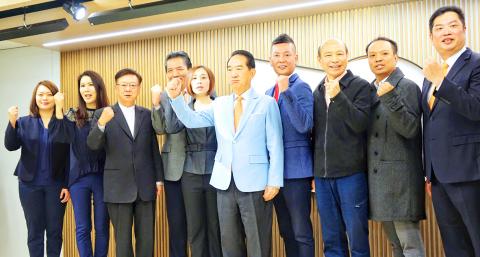Hon Hai Precision Industry Co founder Terry Gou’s (郭台銘) bid for the presidency has ended, but his influence on national politics is to continue as two aides and a friend were added yesterday to the People First Party’s (PFP) list of legislator-at-large nominees.
The party’s top nominees, from No. 1 to No. 10, are League for Persons with Disabilities secretary-general Eva Teng (滕西華), PFP Legislator Lee Hung-chun (李鴻鈞), United Microelectronics Co honorary vice chairman John Hsuan (宣明智), Yonglin Foundation chief executive director Amanda Liu (劉宥彤), PFP Legislator Chen Yi-chieh (陳怡潔), former Chinese Nationalist Party (KMT) legislator Chang Sho-wen (張碩文), former Mackay Memorial Hospital vice president Shih Shou-chuan (施壽全), retired Armed Forces Reserve Command major general Lee Hai-tung (李海同), Yonglin Foundation deputy executive director Evelyn Tsai (蔡沁瑜) and Kao Han-nan (高翰男), an Aborigine with a doctorate in music.
Nominees No. 11 to No. 22 include those of Hakka ancestry, travel industry representatives, academics and young entrepreneurs.

Photo: Liu Hsin-de, Taipei Times
Tsai and Liu work at the Yonglin Foundation, which was created by Gou to carry out educational initiatives nationwide.
Hsuan, whom PFP Chairman James Soong (宋楚瑜) called the “godfather of Taiwan’s high-tech industry,” is one of Gou’s close friends.
Asked why he agreed to be nominated, Hsuan said that Gou’s participation in the KMT presidential primary played a major role in his decision.
“Gou told me that he has dedicated himself to the nation and asked me what I have done for Taiwan,” Hsuan said.
“We both feel that politics is the greatest public good, and that it should be promoted through good policies. Good policies must be introduced at the Legislative Yuan, where legislators propose what they want the government to do. This is why I agreed to be nominated,” he added.
Asked if he spoke on Gou’s behalf, Hsuan said that he spoke for himself and for the nation’s tech industry, adding that he hopes that Taiwan’s advancements in biotechnology, information and communications technology, and other industries can be marketed worldwide, and that the government will use technology to improve the nation’s future.
Liu said that she would represent Gou’s will and the will of the people.
She would speak up for start-ups and focus on education, Liu said, adding that these issues are not necessarily on Gou’s agenda.
Gou had left his mark by making full government subsidies for children aged six and younger one of his key campaign promises, Liu said, adding that the public agrees with that pledge.
Teng — an advocate for healthcare, long-term care issues and people with physical challenges — said she always considered politics a grinding business, but added that she has dealt with politicians as a lobbyist for 25 years.
“As a social worker, I realize that the difficulties facing socially disadvantaged people cannot be solved by themselves alone,” Teng said. “They need to be solved through regulation and policy changes. People say we are only doing things for them, but everything that we have done over the past two decades is for us and our families’ futures.”

Nipah virus infection is to be officially listed as a category 5 notifiable infectious disease in Taiwan in March, while clinical treatment guidelines are being formulated, the Centers for Disease Control (CDC) said yesterday. With Nipah infections being reported in other countries and considering its relatively high fatality rate, the centers on Jan. 16 announced that it would be listed as a notifiable infectious disease to bolster the nation’s systematic early warning system and increase public awareness, the CDC said. Bangladesh reported four fatal cases last year in separate districts, with three linked to raw date palm sap consumption, CDC Epidemic Intelligence

The manufacture of the remaining 28 M1A2T Abrams tanks Taiwan purchased from the US has recently been completed, and they are expected to be delivered within the next one to two months, a source said yesterday. The Ministry of National Defense is arranging cargo ships to transport the tanks to Taiwan as soon as possible, said the source, who is familiar with the matter. The estimated arrival time ranges from late this month to early next month, the source said. The 28 Abrams tanks make up the third and final batch of a total of 108 tanks, valued at about NT$40.5 billion

Two Taiwanese prosecutors were questioned by Chinese security personnel at their hotel during a trip to China’s Henan Province this month, the Mainland Affairs Council (MAC) said yesterday. The officers had personal information on the prosecutors, including “when they were assigned to their posts, their work locations and job titles,” MAC Deputy Minister and spokesman Liang Wen-chieh (梁文傑) said. On top of asking about their agencies and positions, the officers also questioned the prosecutors about the Cross-Strait Joint Crime-Fighting and Judicial Mutual Assistance Agreement, a pact that serves as the framework for Taiwan-China cooperation on combating crime and providing judicial assistance, Liang

Reports of Taiwanese going missing, being detained or interrogated, or having their personal liberties restricted in China increased about fourfold annually last year, the Mainland Affairs Council (MAC) said yesterday. Last year, 221 Taiwanese who traveled to China were reported missing, were detained and interrogated, or otherwise had their personal freedom restricted, up from 55 the previous year, the council said. Reopening group tours to China would be risky, as it would leave travelers with no way to seek help through official channels after Beijing shut down dialogue between the associations tasked with handling cross-strait tourism, the MAC said. Taipei’s Taiwan Strait Tourism